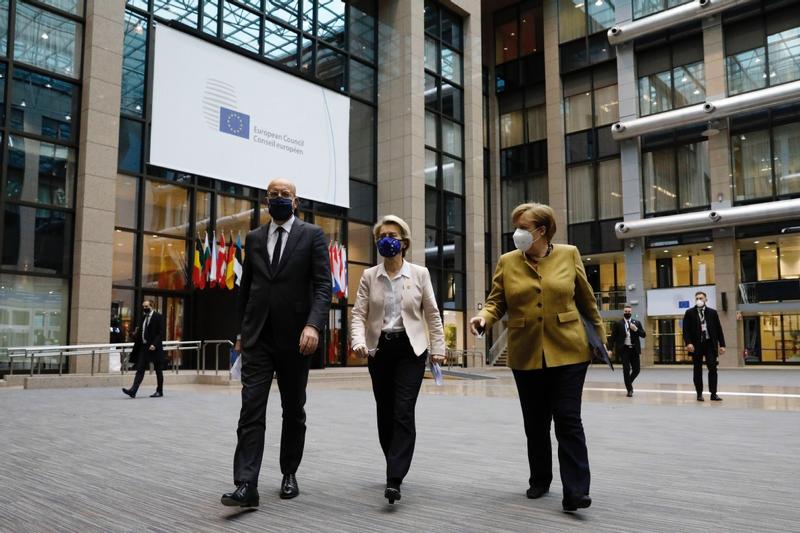 European Council President Charles Michel, European Commission President Ursula von der Leyen (center) and German Chancellor Angela Merkel leave an EU summit in Brussels on Friday. (EUROPEAN UNION / XINHUA)
European Council President Charles Michel, European Commission President Ursula von der Leyen (center) and German Chancellor Angela Merkel leave an EU summit in Brussels on Friday. (EUROPEAN UNION / XINHUA)
European Union leaders have applauded a hard-won agreement to cut carbon emissions by at least 55 percent by 2030, a target that still falls short of expectations of environmental groups and lawmakers.
After lengthy haggling, leaders of the EU's 27 member states, at a summit in Brussels, reached agreement early on Friday to raise the bloc's carbon emissions reduction goal for 2030 to net 55 percent from the current goal of 40 percent from the 1990 levels.
All EU countries should benefit from the transition — with economic growth, a cleaner environment and healthier citizens
Ursula von der Leyen, president of European Commission
"We are here today somewhat exhausted, having negotiated through the night, but I truly believe we can be thoroughly satisfied with what has been achieved," European Commission President Ursula von der Leyen said on Friday, citing the agreements on the 2030 climate target as well its long-term budget and coronavirus recovery fund, totaling 1.8 trillion euros (US$2.2 trillion).
"It is a good day for Europe," she said, adding that the agreement "puts us on a clear path toward climate neutrality in 2050".
READ MORE: China’s carbon neutrality challenge
"All EU countries should benefit from the transition-with economic growth, a cleaner environment and healthier citizens."
The EU leadership, which took power on Dec 1 last year, unveiled its Green Deal on the 11th day in office with the goal of making the bloc the world's first climate neutral continent by 2050. It proposed a European Climate Law in March to help achieve the goal.
The agreement is "in my view, a very important result", German Chancellor Angela Merkel said. Germany holds the EU Council presidency for the second half of this year.
"It was worth losing a night's sleep to achieve this. I don't want to imagine what would have happened if we had not been able to achieve such a result."
Poland's Prime Minister, Mateusz Morawiecki, was also happy with the agreement, saying "it was very important for us to negotiate a climate agreement that was good for Poland".
Poland, Hungary and the Czech Republic are some of the member states that had reservations earlier for an ambitious target.
ALSO READ: Experts hail East Asian carbon-neutrality pledges
Romania's President Klaus Iohannis said the new goal "will modernize the European Union's economies and improve the lives of European citizens".
Not sufficient yet
The new target still needs to be approved by the European Parliament, some of whose members have been calling for a 60-percent reduction by 2030.
Jytte Guteland, a Swedish MEP and a member of the Social Democrats, said she is glad that the EU summit finally decided on the new 2030 climate targets.
"It is important that we finally can start negotiating the entire EU climate law, something we in the European Parliament have been ready to do since October, when we voted on it," she said on Friday.
"It is important not to be fooled into thinking that a net target of 55 percent is sufficient. I have a strong mandate from the elected representatives in the European Parliament to push for more climate ambition."
Greenpeace also voiced its disappointment.
"Governments will no doubt call it historic, but the evidence shows that this deal is only a small improvement on the emissions cuts the EU is already expected to achieve," said Sebastian Mang, Greenpeace's EU climate policy adviser.
The net target means only as little as a 50.5-percent cut in real emissions from polluting sectors such as energy, transport and factory farming while relying on climate-impacted forests to absorb enough carbon to reach the 55 percent target, Greenpeace said. The organization supports a 65 percent emissions reduction for the EU.
"This agreement comes timely before the fifth anniversary of the Paris Agreement this Saturday, but falls short of the scale of emission reductions needed for the EU to fairly contribute to limiting temperature increase to 1.5 C," Climate Action Network Europe said.


